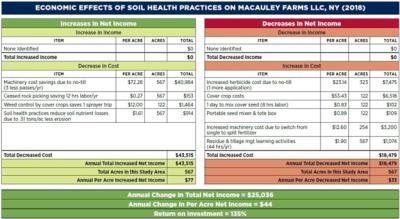The Great Lakes are vital, providing drinking water for millions of people, but cropland in the basin contributes to excess nutrients and phosphorus entering the lakes. Farmers care about protecting water quality, but they face challenges in adopting conservation practices due to tight profit margins, concerns about yield impacts, insecure leases, and complexities with integrating conservation into their current management systems. While these practices are crucial for improving soil health and reducing nutrient runoff, farmers also need to see them as practical and profitable to decide to implement them. Through this project, American Farmland Trust (AFT) aimed to encourage farmers in the Genesee River Watershed to adopt soil regenerative management systems. We accomplished this by expanding a farmer-to-farmer demonstration network, gathering and sharing data on the benefits of regenerative agriculture, and fostering better relationships between landowners and farmers.
One highlight from this project was working with John Macauley of Macauley Farm – a multi-generation beef and crop farm stewarding 1,106 acres in the Genesee River watershed. Through their conservation practices of no-till, planting cover crops, and split fertilizer application, the Macauleys are saving around $72 per acre annually in machinery and labor expenses, while reducing greenhouse gas emissions by 69 percent. John is also happy to not be picking rocks anymore, which were kicked up by tillage.
“I am focused on building my soil health and letting nature do some of the work for me,” John says. “I may not be setting records for high yields, but at the end of the day, I’ve got more money in my pocket instead of shelling it all out upfront.”
John believes that continuing to find ways to improve his soil health will provide even greater returns in the future as he experiments with cover crop mixes to supply nutrients, thereby reducing reliance on inorganic N, P, and micronutrients. American Farmland Trust is grateful to have Macauley Farm as a member of the Genesee River Demonstration Farms Network, where John shares his knowledge and experience with his peers to help spread the adoption of soil health practices throughout the watershed.
To see more examples of economic case studies focused on soil health, and for more information on the Genesee River Demonstration Farm Network please visit our project webpage.


